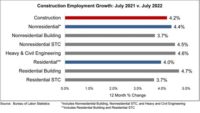Construction employment expanded in 195 metro areas, declined in 90, and was stagnant in 54 between January 2013 and January 2014, according to the Associated General Contractors of America. Association officials noted, however, that despite the gains construction employment remained below peak levels in all but 21 metro areas.
“It is a sign of the continued strengthening of the construction industry that nearly 60% of metros added construction jobs from a year earlier despite the severe winter conditions in much of the country this January,” said Ken Simonson, the association's chief economist. “Nevertheless, the industry’s recovery has a long way to go with only a smattering of metro areas exceeding their previous peak January level of employment.”
Los Angeles, Long Beach, and Glendale, CA, added the largest number of construction jobs in the past year (8,100 jobs, 7%), followed by Houston, Sugar Land, and Baytown, TX (7,900 jobs, 4%).
The largest job losses from January 2013 to January 2014 were in Gary, IN (-4,400 jobs, -25%); followed by Putnam, Rockland, and Westchester, NY (-2,100 jobs, -8%).
Greeley, CO, experienced the largest percentage increase among the 21 cities that hit a new January construction employment high from the prior January peak (20% higher than in 2013). Baton Rouge, LA, added the most jobs since reaching its prior January peak in 2013 (4,500 jobs). Phoenix. Mesa, and Glendale, AZ, experienced the largest drop in total construction employment compared to its prior, January 2006, peak (-80,900 jobs) while Lake Havasu City and Kingman, AZ, experienced the largest percentage decline compared to its January 2006 peak (-69%).
Association officials said the latest figures were a sign that construction employment is rebounding in many parts of the country, but most places still have a long way to go before returning to prior employment levels. They added that many contractors across the country were worried about a possible slowdown in federally-funded transportation projects this summer when the federal Highway Trust Fund is expected to hit a zero balance. As a result, dozens of member firms had already requested over 5,000 “Hardhats for Highways” stickers as part of a campaign being organized by the Transportation Construction Coalition.
“The industry is slowing digging itself out of a construction employment hole that got pretty deep during the past few years,” said Stephen E. Sandherr, the association’s chief executive officer. “If Congress and the Obama administration can't figure out a way to address highway funding shortfalls very soon, that hole is only going to get deeper.”
View construction employment figures by state.






